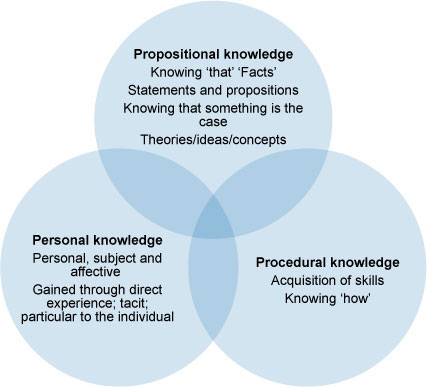1.3 Science in the curriculum
One of the most important factors impacting on a student’s perceptions of, and attitudes towards, science in school will be the department’s schemes of work, and the type of knowledge and pedagogy promoted. Schemes of work will inevitably reflect examination specifications, any statutory curricula requirements that happen to be in force, any current political agendas and initiatives, as well as the values and beliefs about the subject held by the teachers developing them.
When people speak of ‘knowledge’, what do they mean by the term? Is there a shared understanding of the concept? From a philosophical perspective, knowledge is typically divided into three categories:
- Personal knowledge can be thought of as ‘knowledge by acquaintance’ – the kind of knowledge someone claims to have when they say things like ‘I know about dogs’ or ‘I know Mrs Smith’.
- Procedural knowledge can be thought of as knowledge of how to do something – the practical skills of being able to ride a bike, kick a football or mend a leaking pipe, for instance.
- Propositional (declarative) knowledge is sometimes caricatured as being the memorisation of facts. However, a higher order of propositional knowledge is ‘conceptual knowledge’. This is demonstrated through an understanding of the interrelationship between ‘facts’ within a larger framework, such as scientific theories.
These three categories are shown in Figure 1.
The sort of science knowledge that is valued by the education system can be seen in the curriculum and by what is tested through examinations.
Activity 4 Science knowledge in school
Look at the schemes of work and examinations papers from the different examination boards used by your school. Analyse the documents to identify the sort of knowledge that is being assessed and therefore valued. What is the balance of personal, procedural and propositional knowledge in each? What value is placed on conceptual knowledge as opposed to ‘facts’?

